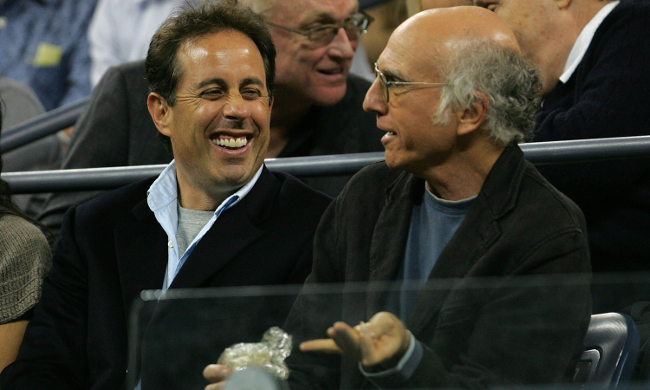
One of the recurring themes in the recent discussions that we’ve had with Seinfeld‘s writers is how Larry David and Jerry Seinfeld really only had one concern when it came to making their show about nothing: It just had to be funny. They didn’t care about anything other than what made their series hilarious, not the critics (even if Seinfeld was very much a critical darling) and certainly not the network’s “suggestions,” of which there weren’t many, but executives certainly tried to make a Friends crossover happen at least two times.
When we spoke to Peter Mehlman earlier this year, he opened our eyes to the fact that NBC had at one point wanted the gang from Friends to have a run-in with Jerry and George. After all, Friends and Mad About You had a crossover, so why couldn’t the worlds of Monk’s Café and Central Perk collide, too? Well, because David knew that it was a bad idea, and his word was all that mattered.
“We were at a point where as a show we could get away with anything, so it might be interesting to have somebody get knocked off,” Mehlman told us. “There was one time when NBC was suggesting there be a crossover night where the characters from Seinfeld would be on Friends and vice-versa. Larry immediately said, ‘No way are we doing that.’ And I said to Larry, ‘You know what would be good, though, if we just tell NBC we will do the crossover but in our show Ross would die.’ I think Larry’s arm twitched towards the phone. We had a big laugh about it.”
When it came time to discuss the origins of Festivus with “The Strike” writers Alec Berg, Jeff Schaffer, and Dan O’Keefe, we were curious about Mehlman’s anecdote and wondered if NBC had ever wanted Seinfeld to have a more traditional holiday episode. There was “The Red Dot,” which featured George’s frugality on display. Elaine was humiliated by her own nippish Christmas card in “The Pick,” while George ruined his family’s holiday by converting to Latvian Orthodox in “The Conversion.” In “The Race,” a mall Santa Kramer was wooed by the ideologies of communism, and finally, in “The Strike,” we were introduced to Frank’s aluminum pole. But was there ever a push from NBC to tone it down and just enjoy the season?
“If the network had wanted a holiday episode, we would have never done a holiday episode,” Schaffer explains. “I was just joking with Larry, reminding him of what I use to call ‘the fastest no in show business.’ That was when NBC marketing had this genius idea that all the shows on Thursday night Must See TV, they were all set in New York, there was going to be a blackout in New York. All the shows were going to have this blackout. They started pitching it to Larry and ‘No.’ [laughs]. When he told us, I said, ‘Fastest no in show business?’ And he goes, ‘Yup. No, we’re not doing that.’ So every other show had this stupid blackout and we went on with our show.”
According to Schaffer, NBC ultimately had “zero say” with Seinfeld’s creative process, other than suggesting that the show could be an hour if David had wanted it that way. Otherwise, David and Seinfeld put their feet down and forced the network to believe in them and “behave properly and just let the smart people do their thing.” Of course, the smart people could have killed off Ross Geller in what would have been the most shocking sitcom moment of all time, but it was better for everyone to keep the two worlds from colliding.
“Larry and Jerry were worried about making Seinfeld good, not worrying about Thursday night and the other shows, and also whatever stupid, stupid, stupid ideas NBC marketing had to make it all part of the same Thursday night family,” Schaffer says. “Everyone who worked on that show – all the actors, Larry, Jerry, all the writers – were only worried about one thing and it wasn’t ratings or making the network happy or anything. It was always about making a funny show. All these people working all the time as hard as they could to make it funny and people were still appreciating it, and I think that’s amazing. That this many years later people are still watching the show. It makes you feel that all that hard work, working seven days a week, every day for every year, it paid off. It was worth it.”






